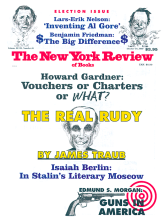To the Editors:
Edmund Morgan’s thoughtful review of my book Serving the Word: Literalism in America from the Pulpit to the Bench [NYR, July 20] requires elucidation of my position. I treat literalism as one of several interpretive styles prevalent in America today. In fact, I argue that even in the simplest societies there are concurrent and competitive styles, the fact of which has been underplayed (or often ignored) by traditional anthropologists, who have tended to create culturally homogeneous pictures of these societies. Aside from describing American literalism, I have tried to develop a way of looking at social hermeneutics in complex societies. I have been quite careful to specify that the features that distinguish literalism—I list ten of them—are conjoined differently in different situations and among different practitioners. They relate to one another in what Wittgenstein called a “family-resemblance” sort of way. I have tried, in other words, to avoid an essentialist understanding of literalism. I do not claim that any interpretive style is impervious to the influence of other styles. They certainly are. Even the Fundamentalists—who seem to have so much vested in their particular reading of the Bible and its extension to the rest of their lives that they prefer separativism to engagement with those who do not share their views—are not immune to influence. (When the Fundamentalists engage with others, as inevitably they must—at work, for example—they tend, not without anguish, to bracket their religion and beliefs. They are of course more comfortable when they are in a position to evangelize those who do not share their faith.) That the Fundamentalists respond to criticism of their position should come as no surprise. Apologetics is always defensive. What is more interesting is the denial that defending a faith can subtly alter it.
I am not arguing that America is an overwhelmingly literalist society. I do note that the literalist interpretation of texts is—and has been—extended to other domains, even those that are not in the strict (should I say literalist?) sense textual, like popular understanding of genetics or those psychotherapies that claim a single, historically definable traumatic event is responsible for a host of psychological problems. What I find significant is the way, at least in the popular imagination, such insistent readings defy the tenets of the sciences they claim to represent. Genes are potentials. Traumas, however real their occurrence, condense experiences that occurred before and after them. There is an implicit textual metaphorization of the nontextual in these extensions; that is, if one gives priority to the texts themselves.
I am grateful to Professor Morgan for calling attention to the fact that the legal opinions I discuss most fully are dissents. I could of course have cited any number of majority opinions to support my argument. Though majority and dissenting opinions are, at one level, the same genre, they are, at another, quite different. In my experience—it is of course limited—dissenting opinions are broader, looser, at times even extravagant, and therefore perhaps more revealing of the interpretive assumptions of the dissenter and the moral and political positions that underlie those assumptions.
I do not deny the role of literalism in any domain—law, religion, genetics, or, for that matter, anthropological accounts of a literalist style. We have, I suppose, to begin with what the philosopher Donald Davidson calls “first meaning.” What is of social, cultural, and political interest is how one moves (if one moves at all) from first meaning to more figurative meanings, to ironic disengagement, and to critique. These will vary from one social, cultural, or communicative situation to another. It is these moves that are revealing of the plays of power and desire—and their constraints—that give to social and cultural life its openness and closure. I have simply tried to call attention to the fact that certain ways of constructing the world and acting on that construction are less conducive to a creative democracy than to the weighty traditionalism that Jefferson decried. I count literalism among them.
Vincent Crapanzano
Distinguished Professor of Anthropology and Comparative Literature
Graduate Faculty, City University of New York
This Issue
October 19, 2000



